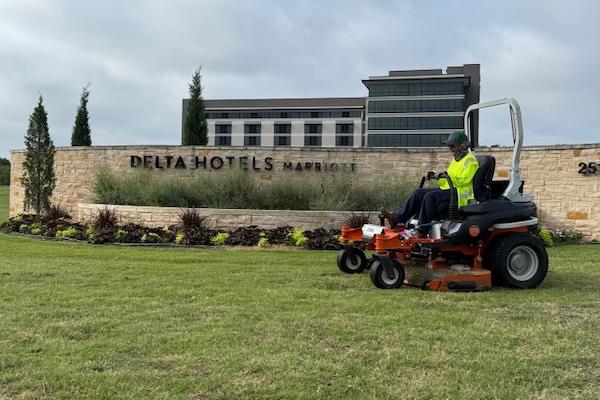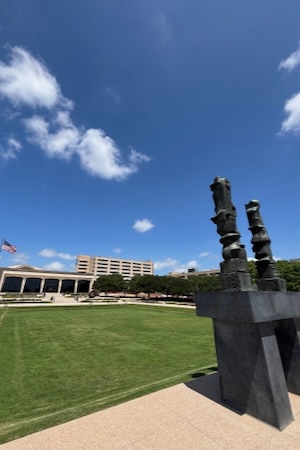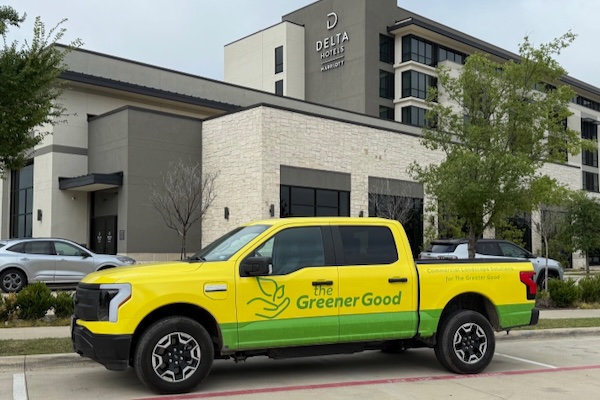
The Greener Good crew manicuring the grounds at Southlake’s Delta Hotel by Marriott in July. Photo courtesy of the Greener Good.
At least 26 U.S. states and well over 100 cities and counties have implemented bans or restrictions on gasoline-powered landscaping equipment. The ordinances cite those machines’ noisy operation, toxic emissions and health risks to the workers who operate them. Texas, in contrast, has moved in the opposite direction, with the 88th Legislature voting in 2023 to ban municipalities from enacting such bans.
The upside is that Texans still have a choice, and homeowners across the Lone Star State are increasingly opting for quieter, emissions-free battery-electric yard machines. Austin, Dallas and Denton residents can even get rebates for buying them. At retailers like Home Depot and Lowe’s, electric mowers and blowers now often outnumber their hydrocarbon-fueled counterparts on store shelves.
But battery-electric lawn tools have been a tougher sell for commercial landscaping crews, which still overwhelmingly rely on gas-driven equipment in Texas and elsewhere. One company bucking that trend is The Greener Good, a new Dallas-Fort Worth-based business that caters to commercial and institutional customers. Using battery-electric-equipment exclusively, the firm stood up its website last November and signed its first client in February. Its stated mission is “to transform commercial landscape services delivery by embracing sustainable practices that protect and enhance the environment.” Despite its recent start, the business has taken off. Already, prestigious organizations like Fort Worth’s Amon Carter Museum of American Art have queued up for the nearly silent service.
 The artfully manicured lawns of Fort Worth’s Amon Carter Museum of American Art, a client of The Greener Good. Staff members say they appreciate the quiet operation of the landscaping business' electric equipment. Photo by John Kent.
The artfully manicured lawns of Fort Worth’s Amon Carter Museum of American Art, a client of The Greener Good. Staff members say they appreciate the quiet operation of the landscaping business' electric equipment. Photo by John Kent.
“We simply believe that now is the time to make this change,” said company founder David Minor, who along with CEO Rick Onstott, leads day-to-day business operations. “Unfortunately, as great as our industry is, and the environmental benefits that plants provide, we've also been significant contributors to both air pollution and noise pollution. We view this as our way to make a difference in our community and really, in particular, in our industry.”
Brian Baier, the Carter’s facilities account manager (through the commercial real estate firm CBRE), has high praise for The Greener Good’s performance, especially in the way the equipment’s hushed operation honors the contemplative nature of an art institution.
“We were looking for a change at the museum, and their environmentally friendly credentials really set them apart from the competition,” Baier said. “We love how quiet the machines are. It’s very hard to tell that they’re even running.”
Though the business is a startup, Minor and Onstott together have accrued a combined 75 years of experience in the landscaping and horticulture industries, including two previous commercial landscape businesses that over the years garnered more than 25 awards. The pair’s business history dates back to 1997, when Minor ran a growing landscaping company and hired Onstott (then a student at Texas A&M) as an intern. Twenty-eight years later, the promise of low noise and zero fumes has proven to be a strong selling point for their new enterprise. Hard work has also moved things along.
“We've done a fair amount of cold calling and digital marketing,” said Minor, whose past titles include president of the National Association of Landscape Professionals. “Just about everybody is excited about the reduction of noise pollution, and I would say a significant percentage appreciate the environmental aspects of us being all-electric.”
The business uses battery-powered versions of equipment typically employed by commercial landscapers: leaf blowers, riding mowers, walk-behind mowers, string trimmers and hedge trimmers. Nearly all of the big players in the landscaping-machinery industry now manufacture commercial-grade electric lawn gear.
“Performance is comparable to gas, maintenance is much better, and while the upfront cost is a significant investment, the long-term cost of the equipment and vehicles is comparable to gas,” said Minor, who notes that he charges clients the same as he would for conventional gas-powered landscaping. To ensure that work proceeds uninterrupted, “the crews take many batteries with them. They are all charged up and ready to go,” Minor said. “Think about batteries being like gas cans for a gas-powered operation.”
You don’t have to be a tree hugger to appreciate the quality-of-life advance that battery-operated landscaping equipment represents. Simply put, they are profoundly quieter and emissions-free. According to the National Institutes of Health, gas-powered leaf blowers can subject their operators to noise levels of 95 decibels, and even when 50 feet away can still be as loud as 80 dB — far above the World Health Organization’s recommended outdoor daytime standard of 55 dB. The NIH states that adverse health effects from such noise “include auditory effects such as hearing loss and tinnitus and non-auditory effects such as reduced cognitive performance and mental health, sleep disruption, ischemic heart disease, myocardial infarction [heart attack] and hypertension.” Electric blowers operate at around 65dB, with noise propagation that is significantly more confined.
The NIH concludes that, “Because of the prevalent use of this type of equipment, it is important for health professionals and policy makers to understand the impact this type of sound may have on surrounding communities.”
Gas-powered leaf blowers also punch above their weight in noxious emissions. According to the California Air Resources Board, “a commercial operator using one backpack leaf blower for one hour generates the same smog-forming emissions as a car driving 1,100 miles.”
And therein lies Minor and Onstott’s principal motivation for getting The Greener Good up and running, with or without the policy makers’ help. In what they characterize on their website as a “lightbulb moment,” the partners undertook an honest assessment of their direct contribution to a warming and increasingly unstable climate.
 The Greener Good uses battery-powered versions of equipment typically employed by commercial landscapers: leaf blowers, riding mowers, walk-behind mowers, string trimmers and hedge trimmers. Courtesy of The Greener Good.
The Greener Good uses battery-powered versions of equipment typically employed by commercial landscapers: leaf blowers, riding mowers, walk-behind mowers, string trimmers and hedge trimmers. Courtesy of The Greener Good.
“We began to look critically at the tools and equipment we’d been using for decades — gas-powered mowers, blowers and trucks, and realized the extent of their impact. The statistics were staggering. For example, operating a commercial lawnmower for just one hour produces as much smog-forming pollution as driving a car 300 miles, and we operated hundreds of these for an average of 800 hours per year. Honestly, we did the math, and we felt compelled to act. We realized that, as leaders in the industry, we had an opportunity, and responsibility, to do better.”
Commercial all-electric lawn services for residential customers are now generally available in most big Texas metros. But such businesses that serve institutional clients remain rare. Minor says that is starting to change.
“We absolutely expect, and I must say welcome, the competition and are already seeing it,” he said. “We hope to inspire the next generation of landscape professionals to follow our lead. We view this as much as a social mission as a for-profit mission, and our legacy play in our industry.”
